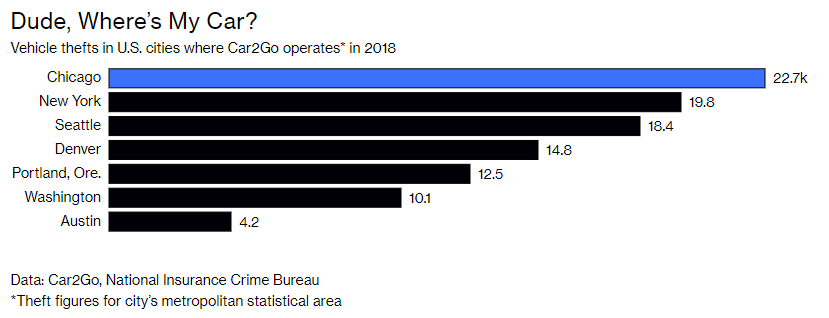Ridesharing company Car2Go experienced a significant theft of its high end cars, including dozens of Mercedes CLA sedans and GLA sport utility vehicles, on what should have otherwise been a dull Monday in April in Chicago, according to Bloomberg.
Demand for Car2Go’s high end vehicles mysteriously spiked one Monday and, instead of these Benz’ being returned, they wound up congregated together on several blocks in West Chicago. When the company’s employees went to retrieve the vehicles, they found a group of thieves had claimed them as their own. Some blocked the vehicles in to prevent repossession while others threatened the company’s employees.
And while Car2Go has the ability to remotely disable vehicles, the situation made it difficult for them to figure out which ones to disable. After the theft, Facebook videos begin showing up of Mercedes’ around Chicago being joyridden, totaled and stripped of parts. Kendell Kelton, a Car2Go spokeswoman said:
“This was a unicorn incident for us as a company. We’ve never seen this type of fraudulent activity at this scale ever, ever.”
Once Car2Go was unable to retrieve the cars on their own, they asked the Chicago Police Department for help. By the middle of the week, the company had suspended service in Chicago altogether, tacitly acknowledging that they couldn’t figure out the difference between legitimate customers from theives. A total of 75 cars were compromised and all were eventually recovered, despite the fact that some of them have been destroyed.
Although rare, this incident highlights one of the major risks inherent to shared internet-connected vehicles. As scooter sharing services are also finding out, lending out a bunch of luxury vehicles to almost anybody that wants them is a great way to wind up with them vandalized or stolen.
Ride sharing networks have struggled in general of late, especially with the rise of Uber and Lyft. Car2Go recently merged with BMWs car sharing network, ReachNow, in hopes of strengthening their operations and broadening their appeal. Together, they operate in a total of nine cities. Car2Go had traditionally subjected all of its users to background checks conducted by humans, but quicker sign ups became a “must have” for ride sharing companies that wanted to bring on more new members faster.
“You see Uber or Lyft, or Airbnb, or all the scooters—they all have instant verification,” Kelton said.
The executive team in Europe, where fraud is much less prevalent, was also eager to lower barriers to entry. So in April, the company stopped conducting manual background checks in favor of automated ones – and almost immediately, about 20 people orchestrated the Mercedes theft by setting up 80 phony accounts using fake or stolen credit cards as payment methods. It’s still unclear whether the theft was a direct result of the policy change or not.
And oddly, the thieves didn’t seem to have much more than joyriding in mind. Many of the vehicles still had their Car2Go stickers on them, functional GPS trackers and license plates. Officers patrolling the area had little trouble spotting the vehicles, because nothing had been modified on them. On one day, police arrested almost 2 dozen joyriders. Only one person was charged with a felony: a 19-year-old who was found with a pocket full of fake credit cards.
This type of attack was unprecedented, but there has been an ongoing stream of smaller incidents in years past. Enterprise, for instance, stopped operating its car sharing service in Chicago in 2017 due to high rates of fraud and vandalism. ReachNow had to wrap up service in Brooklyn in 2018 after many vehicles begin disappearing after the company implemented an automated approval process.
Also, for Car2Go, it hasn’t been unusual for people to sublease vehicles after they order them from the service. The practice is in violation of Car2Go’s rules and has been an issue in Chicago since the company started operating there. Car2Go has since reverted back to manually reviewing new accounts in Chicago and says it hasn’t had any serious issues since then.
via ZeroHedge News https://ift.tt/2NQaOD8 Tyler Durden

